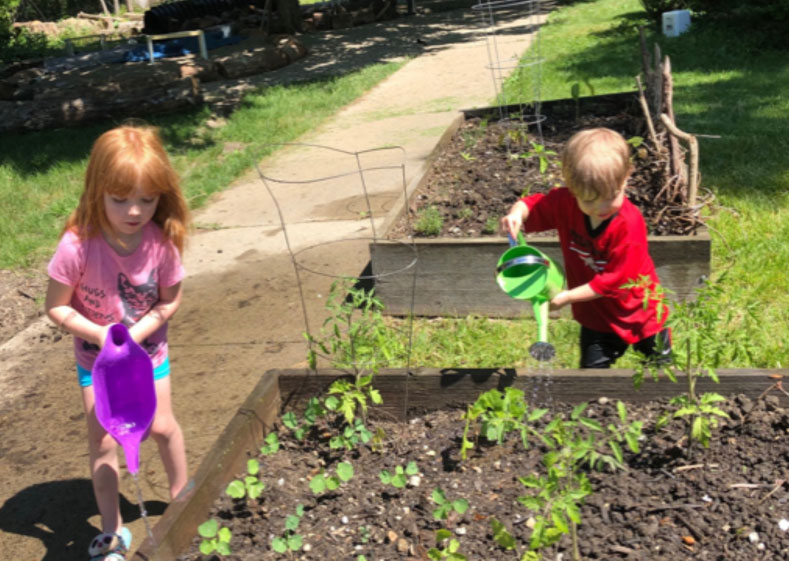Nightingale dedicates more than half of its campus at 2525 Limestone to sowing the seeds of a permaculturally designed Edible Schoolyard. A love of the natural world and organic farming provides an integrating context for experiential learning. Student teams work tirelessly to enhance the outdoor “classrooms” by landscaping an edible forest arboretum with native plantings, wetland habitats, raised organic vegetable and pollinator gardens, and a winter greenhouse with culinary herbal beds. Our teaching kitchen and learnng gardens furnish a laboratory for an interdisciplinary curriculum in sustainable ecosystems. This includes vegetable gardening, lunch preparation from summer harvests, canning fruits & vegetables, tending farm animals and bees, and partnering with other food-growing communities in the region.

Growing our Garden - Growing Ourselves
A two-year implementation grant from the USDA helped the school pilot this living laboratory on our new 10-acre campus. It enabled us to expand our Learning Gardens and equip a Community Teaching Kitchen for hosting community workshops. The USDA grant aligns perfectly with Nightingale’s widening focus on the Edible Schoolyard experience. The purpose of the grant is to bring more locally sourced foods into school cafeterias – particularly in urban food deserts – and to integrate agriculture and nutrition education into the standard curriculum.
Nightingale envisions an Urban Community Food Hub centered on our new school campus. Our goal is to improve commuity acess to locally grown organic food for the health of our children and their families in Springfield. "Edible education," says Edible Schoolyard pioneer, Alice Waters, "makes sure that chilren grow up feelig the soil with their owb fingers, harvesting its bounty in the American sunshine and watching their own hands make the kind of beautiful, inexpensive food that can nourish the body and spirt. Only then," she says, "will the next generations of Americans know that we don't just vote in the ballot box, we vote for the kind of world we want every time we choose what to eat."
PEACE COMES FROM THE SOIL: To create a nurturing and healthy learning environment at Nightingale, we seek to engender the values of collaborative, hands-on learning, purpose-driven inquiry, and the steadfast work of peace in our community and in our world. As Maria Montessori said, “peace is the work of education.” Here at Nightingale Montessori, new seeds are being planted on our own grounds that will enable us to grow this fertile dream into a new and ever more fruitful reality.
Permaculture: Three core ethics: Earth Care – People Care – Fair Share
Permaculture is the art and science of designing the place of human beings in the natural ecosystem. It teaches us to understand and mirror in our own actions the patterns found in healthy natural environments. When correctly designed, such a system will “naturally” become more diverse, self-sustaining, and climate resilient. The principles of permaculture are emblematic of the core values of this school:
As we cultivate the land, restore the “enchanted forest” habitat with native species, plant kitchen herb beds, rain gardens, pollinator and medicinal plots, as we reap fruits, nuts, berries and mushrooms, we also learn the arts of restorative justice, the skills of resilience and adaptation, and the knowledge it takes to prosper in these challenging times. As we learn to take care of the Earth, we learn to take care of each other, thriving as cooperative community.